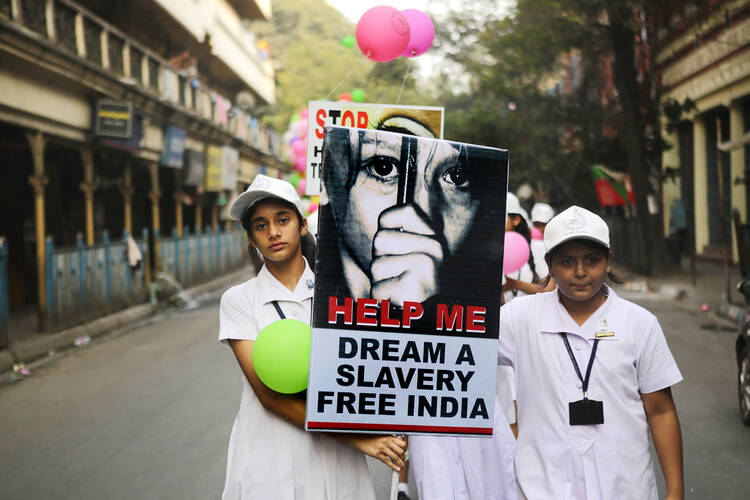The Vatican is hosting a two-day summit of judges, prosecutors and magistrates from many countries, including an important delegation from the United States, to share experiences and best practices in combatting human trafficking and to make proposals for promoting more effective legislation in this field.
Pope Francis will address the meeting on the first evening, June 3, the Vatican announced today. (See update on his remarks.)
It said participants include a U.S. delegation led by the ambassador responsible for the Department of State's Office to Monitor and Combat Trafficking in Persons, Susan Coppedge. Also in attendance will be the British high commissioner against modern slavery, the Dutch national rapporteur on trafficking in human beings, the United Nations high commissioner against human trafficking, the Swedish chancellor of justice, Italy’s national anti-Mafia prosecutor and judges from Argentina, Mexico and other places.
Since his time as a bishop in Buenos Aires (1992-2013), Francis has been active in this struggle against human trafficking, supporting nongovernmental organizations that are involved in this field in Argentina. Gustavo Vera, the founder of one of those N.G.O.’s—La Alameda—is one of the coordinators of this summit.
Soon after his election as pope in 2013, Francis wrote to the president of the Pontifical Academy of Sciences, his fellow Argentinean, Archbishop Marcelo Sanchez Sorondo, asking him to take initiatives in the important struggle to combat the different forms of human trafficking and modern slavery. He got to work quickly and this is the third major international summit organized by the Vatican’s Pontifical Academy for Social Sciences, at the pope’s request. In 2014, it hosted a summit with leading representatives of the world’s main Christian denominations and of the other religions—including Muslims and Buddhists—and gained their joint commitment to combat what Francis has called “a crime against humanity.” That crime includes different forms of modern slavery and human trafficking, forced labor, trade in organs and organized crime.
In 2015, the academy brought together the mayors of many of the world’s capitals and metropolises with the same objective in mind.
Introducing this week’s summit, Archbishop Sordono highlighted the global dimensions of the problem. He said it is estimated that 40 million people are victims of the modern forms of slavery and trafficking in terms of forced labor, prostitution, organ trade and drug trafficking. The 60 million displaced persons and 130 million refugees created as a consequence of war, terrorism and climate change, are a breeding ground for traffickers.
At present, he said, “uncorrupted institutions and international agents do not have the appropriate legal instruments to meet the challenges posed by global indifference to the extreme forms indicated,” while “traffickers and the mafia take advantage of these gaps in international law and governance to juggle globally with national and international ‘structures of sin,’ which are very apt at facilitating the making of money by enslaving the most vulnerable.”
The president of the Pontifical Academy said: “The global society needs a new beginning rooted in justice. No instance of justice can tolerate the violence of slavery or of organized crime, and no power must be allowed to corrupt justice.”
At this week’s summit, he said, “We would like to hear from judges how they deal with the issues of sex trafficking, slave labor, organ trade, drug trafficking and organized crime”; “how their own judicial systems could better incorporate our humanitarian values”; and “how capacity-building could enhance judges’ appreciation of the needs of victims and not merely the penalization of traffickers.”
The Vatican prelate noted that one of the questions “without an adequate answer” that keeps coming up in these meetings is this: “How many human traffickers, pimps and drug traffickers are caught and how many ill-gotten gains have been confiscated and directed towards former victims and society?”
At the summit, he said, judges will have an opportunity “to present a specific case they have worked on and share their opinion of what will be (or ought to be) required in the future.”
He hopes that this meeting may serve to enable judges to express and strengthen their responsibility to peoples, sharing best practices and making proposals for increasingly effective legislation for defending victims.
At the end of the meeting, the participants will be invited to sign a declaration, along the same lines as those signed in the two preceding years by religious leaders and mayors.








